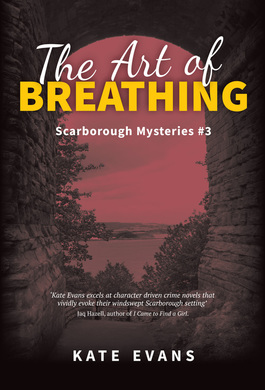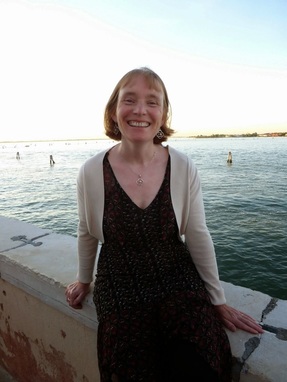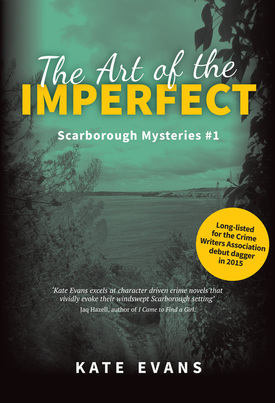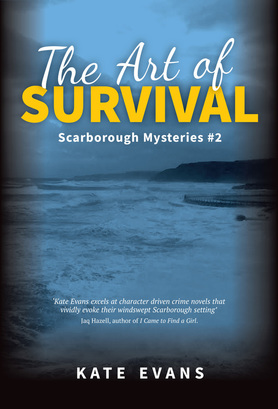| I’m delighted to welcome Kate Evans back to Annecdotal a year on from her popular post on Healing Words. As she’s just published the third novel in her Scarborough Mysteries series, I invited her to spill the beans on why she’s turned to (fictional) crime. Read on for some fascinating insights into the crime writer’s mind. We British like a crime novel, so says Alistair Horne, of Cambridge University Press. It is by far the best selling genre in the UK. Is this because we are a particularly heartless or ghoulish lot? |
I’m not sure Sayers’s explanation was true even then. In her book, Gaudy Night, Sayers’ heroine, Harriet Vane, herself a crime writer, is urged by her soon-to-be lover, Peter Wimsey, to go beyond ‘the the jig-saw kind of story and write a book about human beings for a change.’ Vane protests that it would ‘hurt like hell.’ But Wimsey says ‘What would that matter, if it made a good book.’ Sayers admitted Wimsey was her ideal man, what he says most often reflected her own thoughts.
I am certain, however, that modern crime novels have moved far from being merely a puzzle to be unravelled. Author Val McDermid has said that, of all the genres, crime is the best at tackling current issues. In a recent Artsnight (BBC2, 22nd July 2016), she explored what she described as the ‘complex relationship between truth and fiction.’ She said she had, ‘Walked the fine line between making things up and staying real.’ And, for her, ‘The very act of imagining has been a powerful way of accessing the truth.’
This is echoed by Nigerian writer, Helon Habila, when he said the crime genre was the best at addressing issues in society, it is the best for putting a mirror up to our world and asking questions about it. Polish writer, Zygmunt Miloszewski, said readers of crime novels now expected more than a body, they wanted a guide book, a keyhole onto other cultures and countries. (Quoted from BBC Radio 4 series Foreign Bodies 17th Nov-21st Nov 2014).
When Wimsey said, ‘Write a book about human beings’, what he was aiming at was a book about emotions. In The Guardian Books Blog, June 30th 2014, Melanie McGrath suggests: ‘Crime fiction gives us permission to touch on our own indecorous feelings of rage, aggression and vengefulness, sentiments we’re encouraged to pack away somewhere… where they won’t offend.’
| I am a trained psychotherapeutic counsellor and have spent many years in therapy myself, and I believe we have many potentials. Just as we are capable of great loves and joys, we are also capable of great unhappiness, anger, envy, hate, fear. We are driven by all our emotions. I also believe that unacknowledged feelings are likely to surface in unintended ways. Both writing and reading crime novels allows for a ‘safe’ exploration of our more ‘indecorous feelings’. This maybe particularly true for women who are still expected to be the caring, empathic gender. |
In my novels, I want to explore aspects of mental health. I’m curious about what we mean by mental illness and how we maintain our own well-being. I want to give a flavour of one experience of depression through my character Hannah. Her story strongly echoes my own. I’ve written about my life with depression in many different ways - through poetry, non-fiction and stories. I was surprised to find it equally useful, in terms of clarifying what I feel and went through, and also freeing, to do so through a genre novel. My hope is that readers who have tasted depression will find some comfort in Hannah’s journey and that those who have not will gain greater understanding of the condition.
Book sales and the popularity of TV shows, tells us there is a huge appetite for fictionalised crime. For me, both as reader and writer, the crime genre is a secure space in which to be curious about feelings and actions which would not be acceptable in the real world. It is a way to explore lives which are very different to my own and ask myself, ‘Well what would I have done?’
Kate Evans is a writer of fiction, non-fiction and poetry. Her non-fiction articles have been published in (among other publications) The Guardian, The Independent, Counselling Today, Poetry News, The Journal for Applied Arts in Health and The Journal of Poetry Therapy. Her book Pathways Through Writing Blocks in the Academic Environment was published by Sense Publishers in April 2013. She has created two word-based installations for the arts festival Coastival, one inspired by the works and life of Edith Sitwell. She has an MA in Creative Writing from Sussex University and teaches on the Degree in Creative Writing at the University of Hull, Scarborough campus. She is trained as a psychotherapeutic counsellor and runs workshops exploring the link between creative writing and good mental health.
Her novels, The Art of the Imperfect (2014) long-listed Crime Writers Association debut dagger, The Art of Survival (2015) and The Art of Breathing (publication date: 31st October 2016) comprise her Scarborough Mysteries series. They are set in the North Yorkshire coastal town where she lives.
Click on the images to learn more about her books.
www.scarboroughmysteries.com
[email protected]

























 RSS Feed
RSS Feed





















